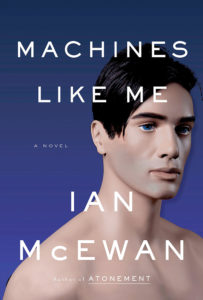Machines Like Me

BY IAN MCEWAN
NAN A. TALESE/DOUBLEDAY, 2019
333 PP., $26.95
Early on in this novel, the momentous question it raises—what is a human being?—becomes maddeningly opaque, and the anguished vibes that pervade Machines Like Me indicate that Ian McEwan isn’t pleased that he can’t delineate more profound answers. The ultimate result, I’m sorry to say, is a peculiar and largely unsatisfying book. But worth reading. Surely if a very good, perhaps major, novelist (Amsterdam, Atonement, et al.) can’t make sense of that question, there is value in observing him wrestle with the subject. And so prepare yourself for Adam, the star of Machines Like Me. He is . . . what? Charlie, the narrator-protagonist of the novel, can’t settle on one descriptive term for Adam, his new state-of-the-art sidekick. At one point he tosses off three—artificial human, android, replicate—and at another, he angrily uses “ambulant laptop.” (Even terminology becomes surly.) I like the latter, but for simplicity’s sake, I’ll stick with android.
Machines Like Me takes place in the United Kingdom but in what I believe science fiction buffs call an alternate universe. It begins in 1982. John F. Kennedy and John Lennon have not been murdered and the Beatles have reassembled. Britain has lost the Falklands War with Argentina and suffered too many horrible casualties, and so disgraced Prime Minister Margaret Thatcher and her Tories lose a Parliamentary election to Labour. The new prime minister is Tony Benn (in real life, an MP for forty-seven years), who (at least in this book) is charismatic, popular, and eager to implement a far-left agenda in a very bedeviled Britain. Then he’s assassinated by the Irish Republican Army. I must say at this point that I don’t believe the alternate-universe trappings add anything to the book’s themes. Withal, the most relevant rewritten-history aspect is that Alan Turing, the great computer scientist, didn’t commit suicide after World War II because of societal opprobrium prompted by his homosexuality. Turing was—in real life and in this book—instrumental in helping the Allies win World War II through his successful efforts to “read” the codes produced by Nazi Germany’s infernally difficult-to-crack Enigma machine. His subsequent scientific tours de force—in the novel—have contributed to the creation of Adam.

Ian McEwan
As the novel commences, Charlie is a middle-class ne’er-do-well who, at the age of thirty-two, is completely broke. “Whenever money came my way, I caused it to disappear,” he laments, blaming his weakness for “schemes, semi-legal ruses, cunning shortcuts.” He resides in the south of London, gets by “playing the stock and currency markets online,” and lives in “genteel ruin.” When Charlie inherits a lot of money after his mother’s death, he spends way too much of it—86,000 pounds—on Adam. This is puzzling for two reasons. While Charlie has always been interested in electronics (he’s even written “a book . . . at high speed on artificial intelligence”) and is fascinated with the new, remarkably humanlike androids that have just come on the market, would he, considering his financial plight, really squander his inheritance on an unnecessary accessory, no matter how beguiling? And it’s improbable that someone capable of writing a book on artificial intelligence couldn’t find a remunerative job.
Charlie loves the beautiful Miranda, who lives in the dingy flat above his dingy flat. McEwan doubtless named her after the heroine in The Tempest, who was delightfully guileless and uncorrupted. Was the author being ironic? It’s hard to see why Charlie persists in his adoration: Miranda is a humorless, narcissistic prig and a callous liar whose deviousness could well have gotten the hapless Charlie roughed up or worse. (Yes, I know that straight men are chumps when it comes to comely women whatever their temperament, but there are limits, aren’t there?) And why would a fetching, cold-blooded, penurious woman like Miranda get involved with a schlub like Charlie, when the apposite—for her personality—thing to do would be to snare a rich beau? An unanswered mystery. Miranda is immersed in graduate work in history, studying the British Corn Laws (a subject that will hardly accelerate the pulse of American readers). She is also determined to adopt Mark, a young boy who enters Charlie’s life in some particularly unpersuasive scenes. One wonders about her adoption plans: Mark radiates misery, which doesn’t augur well for a relationship with Miranda, the disingenuous control freak. Oh yes: Miranda has a one-night stand with Adam, for dishonorable reasons. (Speaking of sex, Adam and his ilk—there are other Adams, and also Eves—are all, presumably, heterosexual. Since we’re living in an era where gender fluidity has gone mainstream, android eros in the book already seems passé.) So perhaps McEwan was being ironic about Miranda’s bonds with Shakespeare’s character. But one can’t be too sure, as is true about my reaction to much of this book.
Considering that Adam is the locus of the novel, the reader must find him both credible and intriguing.
He was advertised as a companion, an intellectual sparring partner, friend and factotum who could wash dishes, make beds and “think” … He was compactly built, square-shouldered, dark-skinned, with thick black hair swept back; narrow in the face, with a hint of hooked nose suggestive of fierce intelligence … Before us sat the ultimate plaything, the dream of ages, the triumph of humanism—or its angel of death.
It might be another of the novel’s possible ironies that this Adonis (is humanity cursed to endure a future containing androids who are all gorgeous?) is, like Miranda, charmless and sanctimonious. Indeed, that makes him much like a lot of the human race. Credible, perhaps—after all, he was created by humans. But not so intriguing. Overall, Adam comes across as more amorphous than complex. At one point he breaks Charlie’s wrist after Charlie tries to hit his “off” button. The moral issues raised by this are left disappointingly vague.
It would be unfair to reveal more of the novel’s plot, so I won’t. I will say that McEwan’s prose by itself should keep people reading to the end. It is impressively mellifluous and might, initially, persuade the reader that the author is more in command of his themes than he is. As it turns out, beneath the plummy, controlled style, McEwan’s forays into apprehending the import and implications of Adam’s existence are murky and off-key, and the disconnect between form and content becomes exasperating. But how could it be otherwise? Most everyone knows—and fears—that artificial intelligence and robotics will unleash radical societal and psychological changes in the lifetime of most people now alive. Why should McEwan be any different? I think—and this is pure speculation—that this novel’s turbid gloom is ultimately a result of the author’s frustration at not knowing what our cybernetic future specifically holds and, perhaps, his anxiety that that future will be nightmarish.
Those interested in our technological destiny ought to read Yuval Harari’s nonfiction 21 Lessons for the 21st Century (which I reviewed in the March/April issue of the Humanist). Harari also presents a bleak high-tech future, but he is explicit about the grave problems he foresees and offers suggestions for solving them. Machines Like Me also brought to mind Thomas Berger’s 2004 novel Adventures of the Artificial Woman. This is one of what I think of as Berger’s “feuilleton novels” (a different species than his epic work, like the wonderful Little Big Man)—a minor jeu d’esprit that still manages to touch on some of the same issues that oppress McEwan but is a lot funnier than McEwan’s book. The mirth is a reminder that one of the necessities we beleaguered Homo sapiens will need when encountering the portentous future is a sense of humor.
In the meantime, let’s all hope that Ian McEwan regains his mojo.
